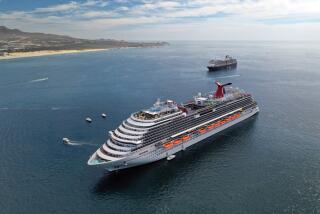Cruise line unmoved by customer’s cancer emergency
You probably aren’t entitled to much flexibility from a cruise line if you cancel a trip several days before the ship sails.
Unless, that is, you or a loved one has just been diagnosed with cancer, in which case you’d think a cruise line or any business would try to show a little compassion — particularly toward a steady customer.
But La Quinta resident David Warlick was told to pound sand when he recently informed Norwegian Cruise Line that he and his wife would have to miss a trip to the Bahamas because his wife had been diagnosed with gallbladder cancer and was undergoing emergency surgery.
“They said it was too close to the cruise time and we should have purchased travel insurance,” Warlick, 66, told me. “They said there was nothing they could do.”
In reality, of course, the company could have responded any way it desired. There’s no law that says a business has to stick to its like-it-or-lump-it customer contract in the event of personal catastrophe.
I can’t help but think about the notion of corporate personhood whenever I encounter an incident like this. Businesses have fought all the way to the U.S. Supreme Court to enjoy the constitutional rights and privileges of human beings.
Yet when called upon to demonstrate a little human decency, they almost unfailingly respond with profound corporate indifference.
“Corporations are people, but they’re not very friendly people,” said Adam Winkler, a professor of constitutional law at UCLA.
Warlick was at his wife’s bedside at UCLA Medical Center when he read my column last week about a woman who was caught in the gunfire this month at Los Angeles International Airport and had to abandon a three-night stay at a Mexican resort.
United Airlines initially wanted to charge her a $200 fee for changing her ticket, and the resort initially refused to refund even a portion of her money because she was a no-show. Both companies eventually did the right thing. United dropped the fee, and the resort refunded all of the woman’s money.
Although Warlick’s main priority at the moment is his wife’s health, he wanted me to know about the similar treatment he received from Norwegian Cruise Line.
He and his wife had spent about $4,500 altogether for the weeklong cruise, which they booked almost six months ago.
“I wasn’t even asking for a refund,” Warlick said. “I just wanted a credit so that we could take a different cruise some other time.”
And considering that Warlick is a member of Norwegian’s Latitudes rewards club, which the company says is for “our most loyal guests,” you’d think the cruise line would find that a reasonable request.
But Norwegian was unimpressed by Carol Warlick’s relatively rare gallbladder cancer, which, at her level of severity, has a low survival rate.
A company rep sent Warlick an email saying that while Norwegian sincerely regrets the couple’s troubles, “we are unable to offer compensation or credit” for the missed voyage.
“Our cancellation guidelines are quite strict, as is standard for the cruise industry,” the company noted. It said that “it would be inconsistent for us to make exceptions when other passengers have canceled and accepted these terms.”
Yet I wonder how many other passengers were forced to cancel because of a cancer diagnosis.
I also have to wonder about the propriety of the Norwegian rep reminding Warlick in the email that “we strongly recommend that our passengers obtain travel protection to cover circumstances such as you and your wife experienced.”
The rep pointed out that Norwegian offers a travel protection plan starting at $29 a passenger.
I’ve never been on a cruise, but considering all the horror stories I’ve heard about missed trips, I wouldn’t hesitate to splurge a little for insurance. An additional $60 seems cheap when protecting a $4,500 investment.
But that doesn’t mitigate the company’s inability to help a loyal customer get through an extraordinary circumstance.
So what if Norwegian had an empty cabin for the trip? Is that really such a devastating blow for a company that pocketed more than $255 million in profit through the first nine months this year?
Vanessa Lane, a spokeswoman for Norwegian Cruise Line, told me that the company really, truly feels bad about what happened to the Warlicks. “We send them our very best wishes for a full and speedy recovery,” she said.
The couple’s request for a travel credit “underwent a thorough review process,” Lane said. But Norwegian was unable to deliver.
“While we certainly understand this unique situation, we must be fair to all of our guests, and we wouldn’t be doing so if we made an exception in this case when other guests have accepted our terms and conditions in the cancellation period,” Lane said.
That’s a fair point, although I’d bet most other Norwegian guests wouldn’t be miffed if the cruise line cut the Warlicks a break.
I’d also bet that the company’s lawyers took one look at the Warlicks’ request and cringed at the thought of setting a legal precedent. So they decided Norwegian should stick to its policy of “no exceptions, no how.”
Winkler, the UCLA law professor, said this wouldn’t be surprising.
“Corporations have a fiduciary duty to their owners to make a profit,” he said. “This doesn’t allow them to have compassion.”
Put another way, Winkler said, “corporations lack the conscience that makes human beings people.”
That’s the thing, isn’t it? Why do we endow such entities with the rights of people when there’s no expectation that they’ll behave like people?
Rather, they do behave like certain people, but those people are sociopaths, unable to demonstrate even the most basic sense of moral responsibility.
I passed Norwegian’s response to Warlick, who on Thursday was still at the hospital with his wife. They hope she’ll be discharged Friday, although it could be weeks before they know whether the cancer has spread through her lymph system.
Warlick took the cruise line’s decision in stride. “Their short-term profits are obviously more important to them than long-term loyalty,” he said.
For their next cruise, Warlick said, he and his wife will take their business elsewhere.
David Lazarus’ column runs Tuesdays and Fridays. He also can be seen daily on KTLA-TV Channel 5 and followed on Twitter @Davidlaz. Send your tips or feedback to david.lazarus@latimes.com.
More to Read
Sign up for The Wild
We’ll help you find the best places to hike, bike and run, as well as the perfect silent spots for meditation and yoga.
You may occasionally receive promotional content from the Los Angeles Times.







